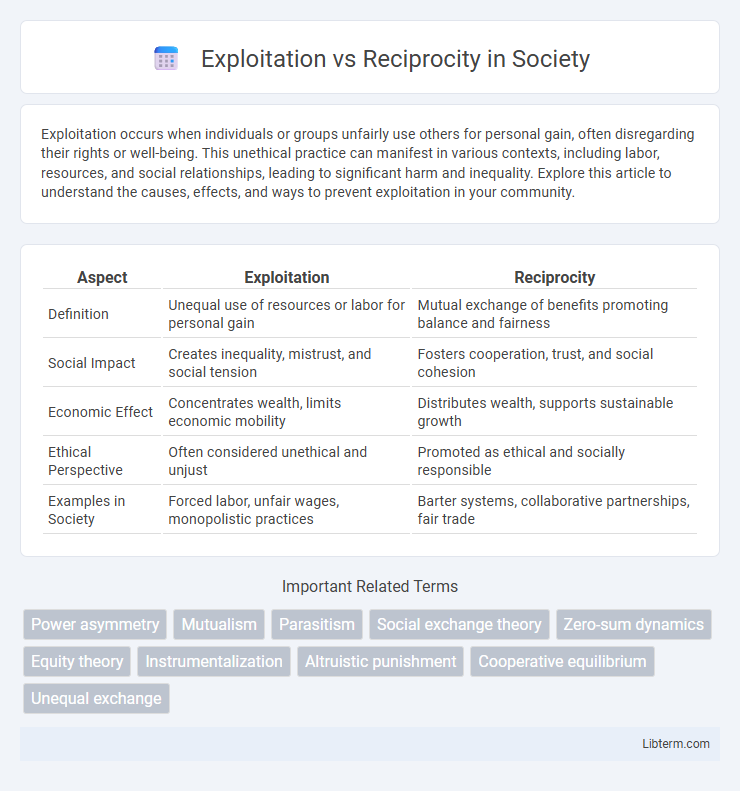Exploitation occurs when individuals or groups unfairly use others for personal gain, often disregarding their rights or well-being. This unethical practice can manifest in various contexts, including labor, resources, and social relationships, leading to significant harm and inequality. Explore this article to understand the causes, effects, and ways to prevent exploitation in your community.
Table of Comparison
| Aspect | Exploitation | Reciprocity |
|---|---|---|
| Definition | Unequal use of resources or labor for personal gain | Mutual exchange of benefits promoting balance and fairness |
| Social Impact | Creates inequality, mistrust, and social tension | Fosters cooperation, trust, and social cohesion |
| Economic Effect | Concentrates wealth, limits economic mobility | Distributes wealth, supports sustainable growth |
| Ethical Perspective | Often considered unethical and unjust | Promoted as ethical and socially responsible |
| Examples in Society | Forced labor, unfair wages, monopolistic practices | Barter systems, collaborative partnerships, fair trade |
Understanding Exploitation and Reciprocity
Understanding exploitation involves recognizing situations where one party benefits unfairly at the expense of another, often through manipulation or coercion, leading to imbalance and harm. Reciprocity is characterized by mutual exchange and cooperation, where parties engage in fair interactions that promote trust and long-term relationships. Analyzing the dynamics between exploitation and reciprocity highlights the importance of ethical behavior and equitable resource sharing in social, economic, and organizational contexts.
Key Differences Between Exploitation and Reciprocity
Exploitation involves taking unfair advantage of others by prioritizing personal gain without mutual benefit, often leading to imbalance and harm in relationships. Reciprocity is characterized by mutual exchange, where parties provide benefits or support to each other, fostering trust and cooperation. The key difference lies in the intention and outcome: exploitation undermines equity and trust, while reciprocity strengthens social bonds through balanced give-and-take.
Psychological Foundations of Exploitation
Psychological foundations of exploitation involve mechanisms such as manipulation, coercion, and the abuse of power dynamics to benefit one party at the expense of another. This exploitation often leverages cognitive biases, emotional vulnerabilities, and social trust to undermine reciprocal relationships. Understanding these psychological underpinnings highlights how exploiters maintain control and prevent equitable exchanges from occurring.
The Science of Reciprocity in Human Relationships
The science of reciprocity in human relationships reveals that mutual exchange of actions and emotions fosters trust, cooperation, and social bonding, contrasting sharply with exploitation, where one party benefits at the expense of another. Neuroscientific studies show that reciprocal interactions activate reward centers in the brain, reinforcing positive behaviors and promoting long-term relationship stability. Understanding this dynamic helps elucidate how equitable exchanges underpin social cohesion and discourage exploitative patterns.
Signs of Exploitative Dynamics
Exploitative dynamics often manifest through one-sided benefit where one party takes advantage of another's resources, time, or effort without fair return or recognition. Signs include consistent imbalance in power, lack of mutual respect, and emotional manipulation aimed at maintaining control. Such dynamics foster resentment and burnout, highlighting the critical need for transparent communication and equitable exchanges in relationships.
Benefits of Practicing Reciprocity
Practicing reciprocity fosters stronger interpersonal relationships by promoting trust, cooperation, and mutual respect, which enhances social cohesion and collaboration in various settings. It encourages sustainable exchanges where all parties benefit, leading to long-term goodwill and reduced conflicts compared to exploitation, which often results in resentment and imbalance. Reciprocity supports emotional well-being and community building by creating a positive cycle of giving and receiving, essential for personal growth and professional success.
Social and Cultural Perspectives on Exploitation
Social and cultural perspectives on exploitation emphasize power imbalances where dominant groups benefit at the expense of marginalized communities, reinforcing systemic inequalities. Reciprocity, deeply rooted in many cultural traditions, promotes mutual respect and equitable exchange, counteracting exploitative dynamics. Understanding these frameworks highlights the necessity of ethical interactions that honor cultural values and social justice principles.
Fostering Reciprocity in Personal and Professional Life
Fostering reciprocity in personal and professional life builds trust, strengthens relationships, and encourages mutual support, creating a foundation for long-term collaboration and success. Emphasizing clear communication, active listening, and consistent follow-through enhances reciprocal behavior by demonstrating reliability and respect. Cultivating an environment where giving and receiving are balanced reduces exploitation risks and promotes equity, cooperation, and shared growth.
Overcoming Exploitative Patterns
Overcoming exploitative patterns requires recognizing imbalanced power dynamics and fostering mutual respect in relationships. Implementing clear boundaries and promoting equitable resource sharing help shift interactions from exploitation to reciprocity. Encouraging transparent communication and accountability further supports sustainable, fair exchanges between parties.
Building Sustainable Relationships Through Reciprocity
Building sustainable relationships through reciprocity involves creating mutual value and fostering trust between parties over time. Reciprocity emphasizes balanced exchanges where both parties contribute and benefit, enhancing cooperation and long-term commitment. This approach contrasts with exploitation, which prioritizes short-term gains at the expense of trust and relationship durability.
Exploitation Infographic

 libterm.com
libterm.com